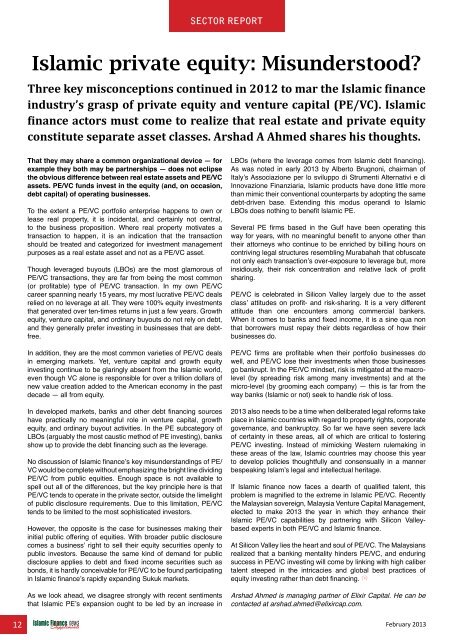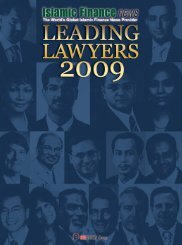View PDF Edition - Islamic Finance News
View PDF Edition - Islamic Finance News
View PDF Edition - Islamic Finance News
You also want an ePaper? Increase the reach of your titles
YUMPU automatically turns print PDFs into web optimized ePapers that Google loves.
sector report<br />
<strong>Islamic</strong> private equity: Misunderstood?<br />
Three key misconceptions continued in 2012 to mar the <strong>Islamic</strong> finance<br />
industry’s grasp of private equity and venture capital (PE/VC). <strong>Islamic</strong><br />
finance actors must come to realize that real estate and private equity<br />
constitute separate asset classes. Arshad A Ahmed shares his thoughts.<br />
That they may share a common organizational device — for<br />
example they both may be partnerships — does not eclipse<br />
the obvious difference between real estate assets and PE/VC<br />
assets. PE/VC funds invest in the equity (and, on occasion,<br />
debt capital) of operating businesses.<br />
To the extent a PE/VC portfolio enterprise happens to own or<br />
lease real property, it is incidental, and certainly not central,<br />
to the business proposition. Where real property motivates a<br />
transaction to happen, it is an indication that the transaction<br />
should be treated and categorized for investment management<br />
purposes as a real estate asset and not as a PE/VC asset.<br />
Though leveraged buyouts (LBOs) are the most glamorous of<br />
PE/VC transactions, they are far from being the most common<br />
(or profitable) type of PE/VC transaction. In my own PE/VC<br />
career spanning nearly 15 years, my most lucrative PE/VC deals<br />
relied on no leverage at all. They were 100% equity investments<br />
that generated over ten-times returns in just a few years. Growth<br />
equity, venture capital, and ordinary buyouts do not rely on debt,<br />
and they generally prefer investing in businesses that are debtfree.<br />
In addition, they are the most common varieties of PE/VC deals<br />
in emerging markets. Yet, venture capital and growth equity<br />
investing continue to be glaringly absent from the <strong>Islamic</strong> world,<br />
even though VC alone is responsible for over a trillion dollars of<br />
new value creation added to the American economy in the past<br />
decade — all from equity.<br />
In developed markets, banks and other debt financing sources<br />
have practically no meaningful role in venture capital, growth<br />
equity, and ordinary buyout activities. In the PE subcategory of<br />
LBOs (arguably the most caustic method of PE investing), banks<br />
show up to provide the debt financing such as the leverage.<br />
No discussion of <strong>Islamic</strong> finance’s key misunderstandings of PE/<br />
VC would be complete without emphasizing the bright line dividing<br />
PE/VC from public equities. Enough space is not available to<br />
spell out all of the differences, but the key principle here is that<br />
PE/VC tends to operate in the private sector, outside the limelight<br />
of public disclosure requirements. Due to this limitation, PE/VC<br />
tends to be limited to the most sophisticated investors.<br />
However, the opposite is the case for businesses making their<br />
initial public offering of equities. With broader public disclosure<br />
comes a business’ right to sell their equity securities openly to<br />
public investors. Because the same kind of demand for public<br />
disclosure applies to debt and fixed income securities such as<br />
bonds, it is hardly conceivable for PE/VC to be found participating<br />
in <strong>Islamic</strong> finance’s rapidly expanding Sukuk markets.<br />
LBOs (where the leverage comes from <strong>Islamic</strong> debt financing).<br />
As was noted in early 2013 by Alberto Brugnoni, chairman of<br />
Italy’s Associazione per lo sviluppo di Strumenti Alternativi e di<br />
Innovazione Finanziaria, <strong>Islamic</strong> products have done little more<br />
than mimic their conventional counterparts by adopting the same<br />
debt-driven base. Extending this modus operandi to <strong>Islamic</strong><br />
LBOs does nothing to benefit <strong>Islamic</strong> PE.<br />
Several PE firms based in the Gulf have been operating this<br />
way for years, with no meaningful benefit to anyone other than<br />
their attorneys who continue to be enriched by billing hours on<br />
contriving legal structures resembling Murabahah that obfuscate<br />
not only each transaction’s over-exposure to leverage but, more<br />
insidiously, their risk concentration and relative lack of profit<br />
sharing.<br />
PE/VC is celebrated in Silicon Valley largely due to the asset<br />
class’ attitudes on profit- and risk-sharing. It is a very different<br />
attitude than one encounters among commercial bankers.<br />
When it comes to banks and fixed income, it is a sine qua non<br />
that borrowers must repay their debts regardless of how their<br />
businesses do.<br />
PE/VC firms are profitable when their portfolio businesses do<br />
well, and PE/VC lose their investments when those businesses<br />
go bankrupt. In the PE/VC mindset, risk is mitigated at the macrolevel<br />
(by spreading risk among many investments) and at the<br />
micro-level (by grooming each company) — this is far from the<br />
way banks (<strong>Islamic</strong> or not) seek to handle risk of loss.<br />
2013 also needs to be a time when deliberated legal reforms take<br />
place in <strong>Islamic</strong> countries with regard to property rights, corporate<br />
governance, and bankruptcy. So far we have seen severe lack<br />
of certainty in these areas, all of which are critical to fostering<br />
PE/VC investing. Instead of mimicking Western rulemaking in<br />
these areas of the law, <strong>Islamic</strong> countries may choose this year<br />
to develop policies thoughtfully and consensually in a manner<br />
bespeaking Islam’s legal and intellectual heritage.<br />
If <strong>Islamic</strong> finance now faces a dearth of qualified talent, this<br />
problem is magnified to the extreme in <strong>Islamic</strong> PE/VC. Recently<br />
the Malaysian sovereign, Malaysia Venture Capital Management,<br />
elected to make 2013 the year in which they enhance their<br />
<strong>Islamic</strong> PE/VC capabilities by partnering with Silicon Valleybased<br />
experts in both PE/VC and <strong>Islamic</strong> finance.<br />
At Silicon Valley lies the heart and soul of PE/VC. The Malaysians<br />
realized that a banking mentality hinders PE/VC, and enduring<br />
success in PE/VC investing will come by linking with high caliber<br />
talent steeped in the intricacies and global best practices of<br />
consulting www.<strong>Islamic</strong><strong>Finance</strong>Consulting.com<br />
www.<strong>Islamic</strong><strong>Finance</strong>Events.com<br />
equity investing rather than debt financing.<br />
www.<strong>Islamic</strong><strong>Finance</strong><strong>News</strong>.com<br />
www.<strong>Islamic</strong><strong>Finance</strong>Training.com<br />
As we look ahead, we disagree strongly with recent sentiments<br />
that <strong>Islamic</strong> PE’s expansion ought to be led by an increase in<br />
www.MIFforum.com<br />
www.MIFmonthly.com<br />
Arshad Ahmed is managing partner www.MIFtraining.com of Elixir Capital. He can be<br />
www.REDmoneyBooks.com<br />
contacted at arshad.ahmed@elixircap.com.<br />
12 February 2013
















